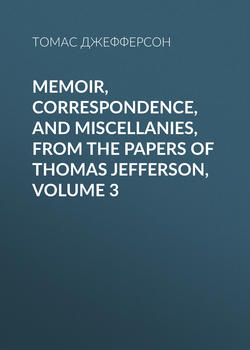Читать книгу Memoir, Correspondence, And Miscellanies, From The Papers Of Thomas Jefferson, Volume 3 - Томас Джефферсон, Thomas Jefferson - Страница 43
LETTER XLIII.—TO M. LA FOREST, August 30, 1790
ОглавлениеTO M. LA FOREST, Consul of France,
New York, August 30, 1790.
Sir,
I asked the favor of the Secretary of the Treasury to consider the fourth article of the consular convention, and to let me know whether he should conclude that Consuls not exercising commerce, were exempt from paying duties on things imported for their own use. I furnished him no explanation whatever, of what had passed on the subject at the time of forming the convention, because I thought it should be decided on the words of the convention, as they are offered to all the world, and that it would only be where these are equivocal, that explanations might be adduced from other circumstances. He considered the naked words of the article, and delivered to me as his opinion, that, according to these, the first paragraph, ‘The Consuls and Vice-Consuls, &c. as the natives are,’ subjected all their property, in whatever form and under whatever circumstances it existed, to the same duties and taxes to which the property of other individuals is liable, and exempts them only from taxes on their persons, as poll-taxes, head-rates for the poor, for town-charges, &c.; and that the second paragraph, ‘Those of the said Consuls, he or other merchants,’ subjected such of them as exercised commerce, even to the same personal taxes as other merchants are: that the second paragraph is an abridgment of the first, not an enlargement of it; and that the exemption of those, not merchants, which seemed implied in the words of the second paragraph, could not be admitted against the contrary meaning, directly and unequivocally expressed in the first.
Such, Sir, was his opinion, and it is exactly conformable to what the negotiators had in view in forming this article. I have turned to the papers which passed on that occasion, and I find that the first paragraph was proposed in the first project given in by myself, by which the distinction between taxes on their property and taxes on their persons, is clearly enounced, and was agreed to: but as our merchants exercising commerce in France, would have enjoyed a much greater benefit from the personal exemption, than those of France do here, M. de Reyneval, in his first counter-project, inserted the second paragraph, to which I agreed. So that the object was, in the first paragraph, to put Consuls, not being merchants, on the same footing with citizens, not being merchants; and in the second, to put Consuls, merchants, on the same footing with citzens, merchants.
This, Sir, we suppose to be the sense of the convention, which has become a part of the law of the land, and the law, you know, in this country, is not under the control of the executive, either in its meaning or course. We must reserve, therefore, for more favorable occasions, our dispositions to render the situation of the Consuls of his Majesty as easy as possible, by indulgences, depending more on us; and of proving the sentiments of esteem and attachment to yourself personally, with which I have the honor to be, Sir, your most obedient and most humble servant,
Th: Jefferson.
